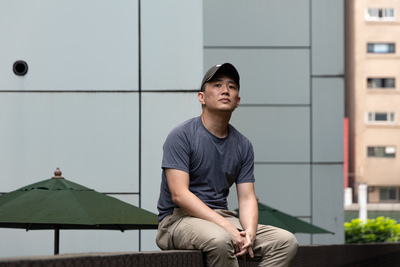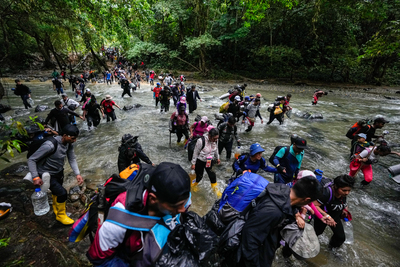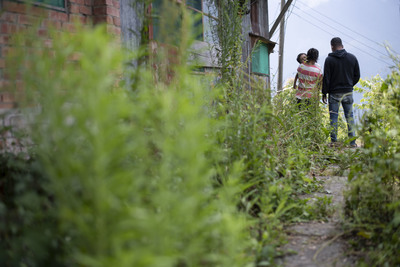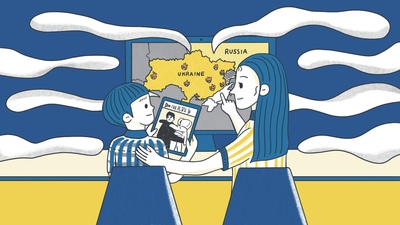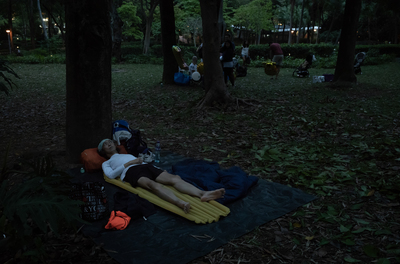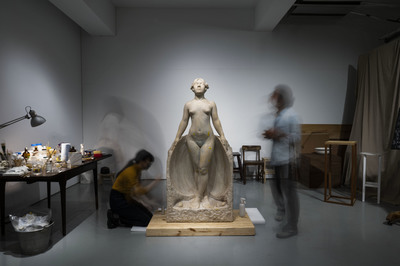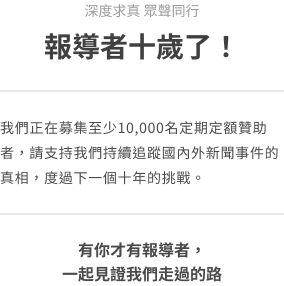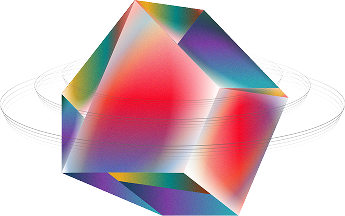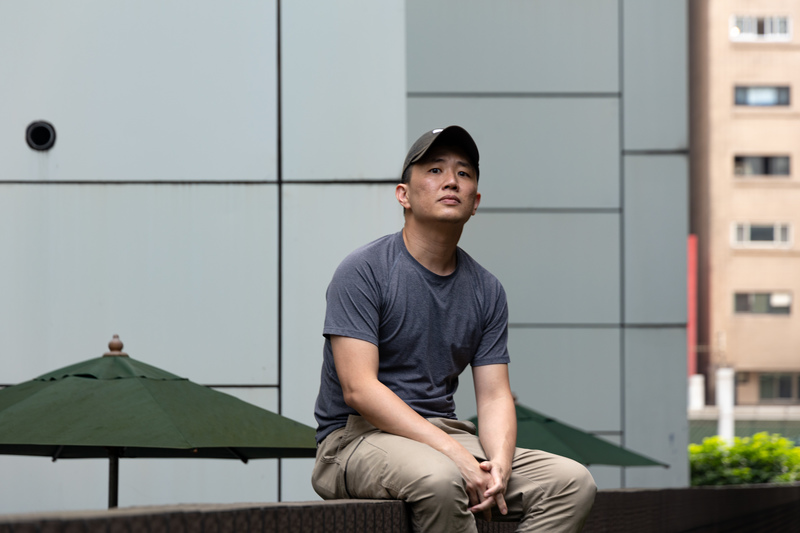
The Kaohsiung Film Archive commissions the creation of documentary films on the city of Kaohsiung, to exhibit “local people’s identification with the land, and display Kaohsiung’s local cultural scene through visuals”. Twenty-five documentary films have been made over the past ten years, which touch on aspects such as folk customs, industry, military dependents' villages, indigenous people, migrant workers, and landscape transformation. Taste of Wild Tomato, which was nominated in the 2022 Taiwan International Documentary Festival (TIDF) competition, is one of the latest commissioned works. The film breaks free of the longstanding framework of discussing and recreating the February 28th Incident, extending from this singular focus to the furthest realms of visual language. Through a loose and poetic narrative, the film casts light upon the multifaceted, uncertain and unstable history of the city, and indeed the country as a whole.
The Kaohsiung Film Archive initially approached director Lau Kek-huat to commission a project with a clear-cut plan and time frame: a 50-minute documentary about the Kaohsiung High School Self-Defence Force during the 228 Incident. However, after two years of shooting, the film that Lau Kek-huat submitted was 2.5 times longer (123 minutes) than planned, with themes extending far beyond the scope of a single subject.
“Previously at the end of a screening, people would angrily walk out; you could hear them saying “That’s history?” But I think that’s actually a good thing. A film can sometimes be used to enrage and provoke you (the audience) to consider whether there’s anything wrong with your own way of thinking.”
Following on from the 2019 feature film Buoluomi and the documentary The Tree Remembers, the Malaysian director, who has been under the spotlight in recent years, focuses on the event that has embroiled Taiwan for nearly 75 years: the 228 Incident. Before Lau began his reading, research and fieldwork, he acknowledged frankly that he had almost no knowledge about 228. However, this meant that he could dig deep into the topic, already heavy with symbolism, emotion, and apathy, without any predisposed baggage or value judgements.
Through the accumulation of research and oral accounts, the history of the Kaohsiung High School Self-Defence Force has become legend. The city of Kaohsiung holds a commemorative event every year; in 2022, under the name Heroes Return to School, a number of veterans from the Kaohsiung High School Self-Defence Force were invited to return to Kaohsiung High School, to a brick wall which was shot and shelled by the Kaohsiung Fortress Commanding Officer Peng Mengji's army. There, they shared their experiences of defending the school grounds and protecting the public, and received tributes of respect, passing down their wisdom and spirits to the young students.
However, throughout the scenes of Taste of Wild Tomato, the viewer does not find much about the actual combat that the Kaohsiung High School Self-Defence Force took part in, or how they resisted the violent oppression of the Kuomintang troops. The film instead centers around male friendship, and the elders reminiscing over their hot-blooded youth, such as the image of Chen Renbei as he wields his baseball bat, face glowing with youthful excitement. What we do not learn from the visuals is that he was originally the vice-captain of the Self-Defence Force, who brought mainlanders into the school to protect them, confronted the military police at the train station, and watched his senior be shot to death. These details, recounted over and over in previous news reports and oral accounts, are almost non-existent.
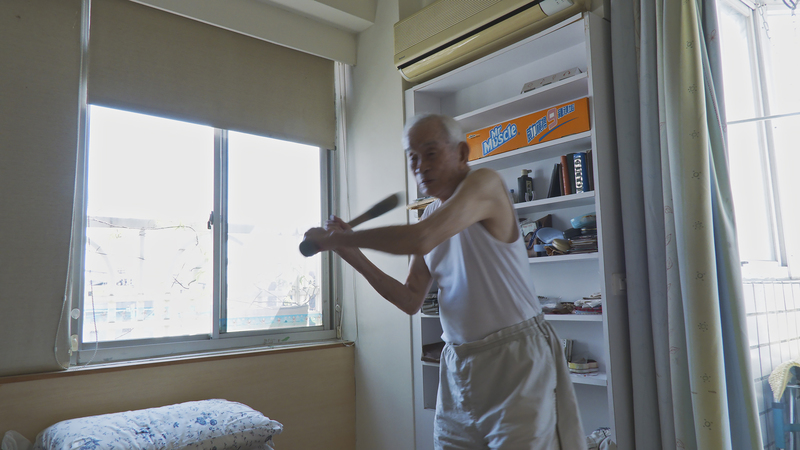
“I had a lot of hesitations towards heroization.” Lau Kek-huat remembered that during the preliminary research stage, officials organized professional researchers to take him to see a bullet-hole riddled wall and other historical remains at Kaohsiung High School. However, this only gave him more doubts about how to interpret this period of history: “the students were armed, and the government wanted stability, where are the problems in that? You say you were protecting people, but how do we know it was protection? From another angle, it could be seen as a hostage situation! Perhaps for Taiwanese people it’s understandable, through the context of the sudden end of Japanese colonialism and then going through 228, but from my perspective as an outsider, that period of history is very chaotic. So, I later decided that I couldn’t just shoot footage from Kaohsiung High School.”
In order to get closer to the human nature beneath the facts of the events, from his remote and unfamiliar historical background, Lau Kek-huat turned his gaze to literature. Amongst the texts that he read, Yang Mu’s essay Love, Beauty and Resistance, which recounts his childhood experiences of the tug-of-war and the confusion of identities during the alternating era of Japanese rule and Kuomintang governance, gave him a glimpse into the nebulous inner worlds of that generation.
“Yang Mu writes about how he revered his Japanese teacher when he went to his home, his desire for sex, how different ethnic groups were treated differently, et cetera. These things put together allowed me to see the complexity of lived experiences around the time of the second world war, that that time shouldn’t just be considered so-called “hostility”. It’s multifaceted. Kenzaburo Oe also wrote that when they were growing up, there were a lot of things that they were still figuring out, and they had a really strong sense of uncertainty. When they lost the war, they also lost their sense of identity, and this had an especially profound effect on adolescents.” Lau Kek-huat said.
“If today we go back and say these people deserve to be commemorated, it's not because they are ‘heroes’, it’s because they were passionate young people who were willing to make a split decision (to form a Self-Defence Force), who, in uncertain circumstances, were willing to go out, knowing it was dangerous, with the bitterness, adventurousness, recklessness and fear of youth in them.”
This “uncertainty” is not merely explored in the content of the film, but also through its form.
In the historical frame, which is made up of old documentary footage as well as new footage, aside from the members of the Kaohsiung High School Self Defence Force, there are also glimpses into the lives of Taiwan-born Japanese soldiers, descendants of the victims of 228, folk artists and people from mainland China who came to Taiwan after the war. The setting shuttles from the Kaohsiung suburbs to the harbor, places of military heritage and public squares, and even the Chiang Kai-Shek Memorial Hall in Taipei. “The film features many opposing political narratives, depicting Japanese military teachings, American air-raids, and mainland Chinese refugees. I intentionally included everything that happened and all of its facets, to the point where later on I realized, I had shot a ‘hybrid’.”
This seemingly loose structure is Lau Kek-huat’s reflection on the nature of film.
“Making a drama wherein you create a world, and persuade an audience to believe in it, is fascist. The creators must raise questions; otherwise how can they allow themselves to possess so much power?” Lao Kek-huat describes that, even though he was writing the script for his next feature film at the same time, he feels that the documentary, which allowed him to go out into real environments, opening up interactions with people and investigating their work, is the foundation of genuine understanding of the world. The way that the visual material is presented also intentionally resists a one-dimensional narrative, incorporating a plethora of axes and voices. This allows for the director to take a step back from his monopoly power of the image.
“I always shoot and think at the same time; you can’t know beforehand whether or not the person you’re shooting will be any help to the film. It’s very rare that someone is willing to tell us their story. It was only after shooting many different people, that I saw what looked like stars lit up in different parts of the sky, and it was as if some dotted lines were linking them together to form a constellation.” Lao emphasized.
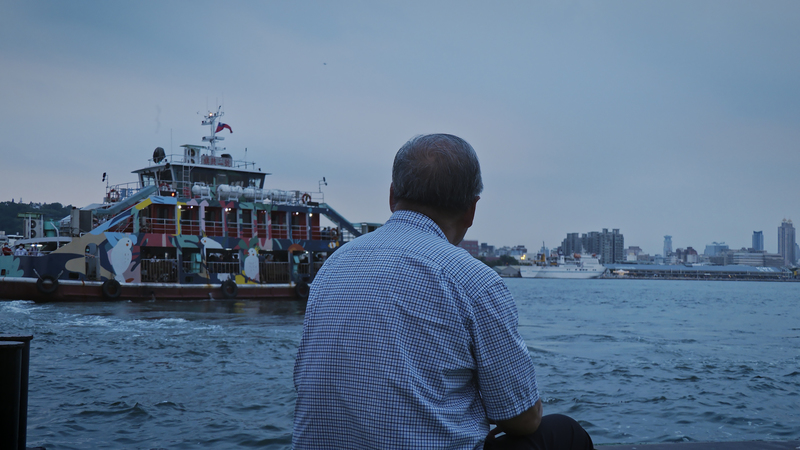
But the tumultuous physical and emotional experiences of the young people, along with the passage of time, has been smoothed over by a carefully constructed version of history, and replaced by clear-cut commemorative gestures.
During the filming process, Lau Kek-huat witnessed how 228 has become a framework for an unspoken collective subconscious, conditioning the perspectives of future generations.
“I interviewed one elder, who at the time of the incident was attending Kaohsiung High School’s Junior Middle School. His grandson, who was studying film, happened to be making a film about his grandfather’s experiences, and so I recorded the process of ‘grandson documenting grandfather’. Kaohsiung High School adopted the Japanese tradition of having a strong hierarchical system. The middle school students weren’t allowed to carry weapons, instead, they were only able to help their seniors by carrying water, and if they made a mistake they would be hit. After this elder had been carrying water for a few days, the situation was becoming increasingly serious, and the seniors announced that the middle schoolers should all return home, with the high schoolers staying behind to take care of things. On the way home, he encountered a stray bullet, and had to take cover in a ditch and crawl the rest of the way… after this, the grandson abandoned filming, as he felt that his grandfather's experiences were in no way heroic, contradicting the media’s perception of 228, as merely carrying water is completely ordinary, and could even be considered cowardly. This made me feel deeply that, unconsciously, the mainstream environment and discourse often makes us violent towards personal experience.” Lau kek-huat expressed that because the film was too long, this material could not be included, and so he later gave his footage to the grandson free of charge.
The first seeds of awareness of the violence and silencing of individuals in the face of “Great History” sprouted from Lau Kek-huat’s first documentary film, Absent Without Leave.
The film interweaves family memory with the history of the development of the Communist Party of Malaya (CPM). Because it touched a nerve, the film was banned in Malaysia.
Under the international situation of the Cold War post-World War II, whether by English colonists, or the Malaysian government founded in 1963, the CPM was a continuously suppressed opposition. To prevent the Chinese people from secretly aiding the CPM to carry out their guerrilla warfare, the government established New Villages to surveil and control them.
Just as during Taiwan’s White Terror Period, the presence of bandit spies was a longstanding taboo, the imprint of the underground CCP members in Taiwan has long been forgotten. Lau Kek-huat’s grandfather joined the CPM, and even within their family there is seemingly an absence of memory of that time.
“My father never spoke of his father. It's not as if there were police forbidding him to speak, he just didn’t think that it was important. We don’t need to know where we came from, we don't need to get too involved in social affairs, or care about politics; to be able to go on with our lives is enough. I didn’t know who Grandpa was, but growing up I was never aware of it. When missing something like that becomes part of your everyday life, it legitimizes it. Like the White Terror, when people are tacitly complicit in state violence, the whole of society leaves that history and memory unspoken.”
From Malaysia to Taiwan, post-World War II, the whole of Asia was in a state of Cold War. As each country was setting out on the uneven road to establishing a national identity, the life experiences of some people or some ethnic groups were suddenly considered wrong:
“It was as if the whole nation’s collective memory was full of black holes. I have seen these black holes from the side of the CPM, in Malaysians and Indians, and now coming to Taiwan, I see them here too.”
From attending school to working, getting married and raising children, Lau Kek-huat, who has obtained R.O.C. citizenship, sees Taiwan as another homeland. He also sees, from his wife’s relatives across the political spectrum, the fissures where history and memory intertwine.
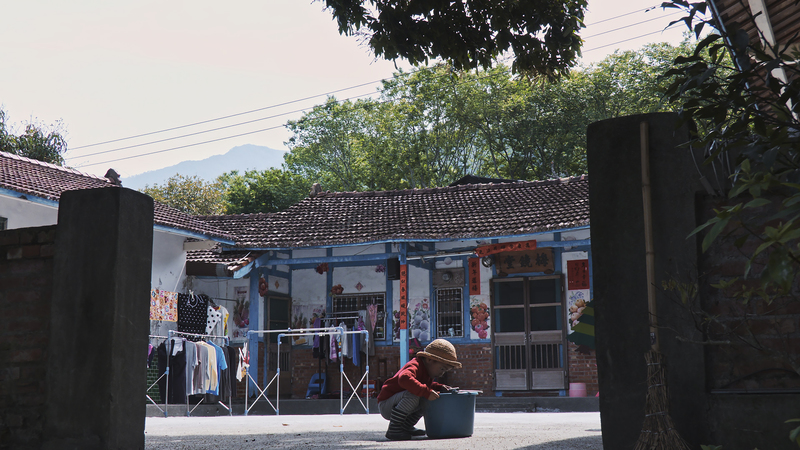
At the other end of the spectrum from silencing, is how rhetoric is constrained by ‘political correctness’.
“During the process of contacting some ex-CPM members, I felt another kind of violence. Although the CPM was disbanded in 1989, up to now, internally they have had a so-called content censorship. In those days, there were people who wanted to write memoirs or speak out, but they self-censored, always having to appear as revolutionary down to their last fighting spirit. They couldn’t speak of hunger, sexual desire, low morale or wanting to give up. You could say they weren’t human; they were clearly being used as pawns. At the time, I just had a feeling that I really wanted to capture people, and then I slowly started to figure out what a documentary is.” Commencing with Absent Without Leave, Lau Kek-huat’s emphasis on personal experience over the “capitalized” official narrative permeates all of his works, including 2019’s The Tree Remembers and his most recent Taste of Wild Tomato.
When Lau Kek-huat met the well-known 228 descendant Lin Licai for the first time, a representative who has long-accused the Kuomintang of committing atrocities, she placed in front of him a large folder she had prepared, full of street photographs, newspaper articles about her father Lin Jie and even about the history of 228.
“She thought that in order to talk about 228, we needed to film these things, but when we met her for the first time we didn’t bring the camera. When I said to auntie Lin that I don't want to just shoot historical facts, she actually thought we didn’t have a clear understanding of the situation.”
Amongst Lau Kek-huat’s extensive reference materials was a 2017 article from The Reporter titled “Searching for the Hidden Political Victims – Daughters in their Fathers’ Shadows”, and so had some awareness of Lin Licai’s private life beyond her public image, shaped by grief and accusation. He brought along this curiosity and persuaded Lin Licai to allow him to record some trivial moments that she originally believed to be insignificant. These images and fragments of life eventually became the core of the whole film, Taste of Wild Tomato. These snapshots of life, which may even go unnoticed by the subject, undergo a subtle transformation as they pass through the lens of the camera.
“At what point did I know that the film was ready? It was when I realized that through the film that we had brought to life, the people I approached had found self-awareness, and the things that they had been through, once hazy and uncertain, became like the precious salt of life.”
According to Lau Kek-huat, who has already dealt with the themes of memory, identity and national narrative in three of his films, the classic dilemma, of whether a documentary should adopt a spectator stance or intervene, is no longer an issue. Regardless of whether using a more straightforward or experimental form, in the end, his visuals create a transformation in the lives of both the filmmaker and his subjects. This is not merely a question of style, but a matter of a deeper “morality”.
“The documentary has long been understood to be a medium that can play a part in advancing social change, but I feel powerless towards this. How much can it really change things? How much can it really help disadvantaged people? If on set, I don’t feel a transformation either within me or my subject, then my film won’t help anyone. This is the most fundamental aspect, before we can start discussing the aesthetics or the narrative. If this doesn’t occur, and the film doesn’t change anyone, then it could be correct, it could be a success, but it would be a little deceitful.”
Lau Kek-huat saw this transformation within Lin Licai, as she recalled anew the sour-sweet taste of the wild tomatoes she picked from her father’s grave when she was three years old. He also saw this transformation within his father. Through watching footage of the other relatives’ oral accounts, his father, who was approaching 70 years of age, understood for the first time that his father, who was a guerrilla fighting in the forests, often risked his life to come home and help bathe him as a new-born.
“Suddenly, the presence of this person I had never met before becomes significant, and they have this connection with my father. And thus, his life didn’t come from nothing. When put together with my own, our heritage begins to feel more and more substantial.” For Lau Kek-huat, this is the power of filmmaking.
“I see this power coming from all of my different subjects. Rather than participate in film festivals, I prefer to return to the filming locations, as there you can feel the magnetism between people, and the possibility for transformation. This is the reason I continue to shoot, and it cannot necessarily be fully replicated at a screening – but I can always go back to the scene. I hope that after watching this documentary, you can go out and meet someone, and find that kind of scene. That’s what a film should do.”
(To read the Chinese version of this article, please click: 讓影像成為生命的鹽──穿越英雄化敘事的廖克發《野番茄》)
深度求真 眾聲同行
獨立的精神,是自由思想的條件。獨立的媒體,才能守護公共領域,讓自由的討論和真相浮現。
在艱困的媒體環境,《報導者》堅持以非營利組織的模式投入公共領域的調查與深度報導。我們透過讀者的贊助支持來營運,不仰賴商業廣告置入,在獨立自主的前提下,穿梭在各項重要公共議題中。
今年是《報導者》成立十週年,請支持我們持續追蹤國內外新聞事件的真相,度過下一個十年的挑戰。

